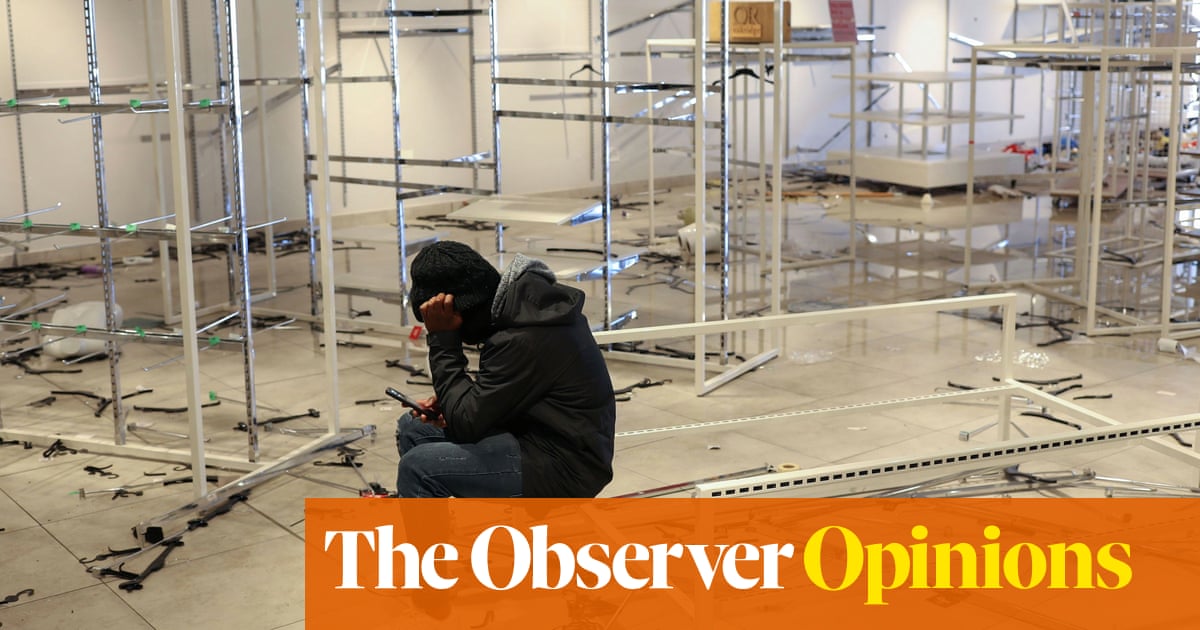
‘It feels qualitatively different this time.” There are few people I know in South Africa who don’t think this about the carnage now engulfing the nation. Violence was institutionalised during the years of apartheid. In the post-apartheid years, it has rarely been far from the surface – police violence, gangster violence, the violence of protest. What is being exposed now, however, is just how far the social contract that has held the nation together since the end of apartheid has eroded.
Many aspects of the disorder are peculiar to South Africa. There are also themes with wider resonance. Events in the country demonstrate in a particularly acute fashion a phenomenon we are witnessing in different ways and in degrees of severity across the globe: the old order breaking down, with little to fill the void but sectarian movements or identity politics.
The immediate cause of the violence was the 15-month sentence imposed on former president Jacob Zuma for refusing to testify at a corruption inquiry. The protests in Zuma’s stronghold of KwaZulu-Natal have, however, morphed into something bigger and more menacing. A combination of people made desperate by poverty and hunger, gangsters seeking to profit from mayhem and political activists settling scores has brought unparalleled turmoil to the country. Corruption may have ensnared Zuma, but it’s not confined to Zuma. In a country in which politics is defined by state patronage, corruption is a central feature. It has allowed for a tiny black middle class to join the ranks of already-rich whites. And, together with social and economic policies that largely benefit the wealthy, it has also helped create the most unequal society in the world.
More than half the population lives in poverty, a quarter in extreme poverty. Unemployment stands at more than 32%. Among youth, three out of four are jobless.
All this has been exacerbated by Covid, devastating lockdowns and government incompetence. Over the past year, almost two-thirds of households had run out of money to buy food in the previous month and almost one in five experienced weekly hunger. And this was before the government stopped Covid relief payments, which will make desperation even more unbearable.
And then there is police violence. In the year 2019/20, there were 629 deaths at the hands of the police and 216 cases of alleged torture. South African police appear proportionately to kill more than twice as many people as their American counterparts. Yet, while global attention has, rightly, been paid to police killings of African Americans, the far more ferocious police violence in South Africa has received much less interest – even within the country. Black lives often matter less, but some black lives seem to matter less than others.
For South Africa’s black population, hopelessness and rage arise from the sense that everything has changed and yet so little has. Apartheid has gone. Black people have the vote. For many, though, the country has, in material terms, barely advanced. Apartheid had an immensely dehumanising impact on communities, but it helped to forge social bonds and channel anger into the movement for liberation. The dehumanising effect of post-apartheid policies has served only to erode the social fabric.
As the failure to tackle poverty has eroded support for the ANC, it has responded by leaning more into the politics of division, leading people to turn their anger at each other. There have been waves of violence, directed against migrant workers, much of it stoked by politicians. Many have also exploited divisions between apartheid-defined categories of people, such as “blacks”, “coloureds” and “Indians”.
The black population is the primary victim of inequality: 64% of black people live in poverty compared with just 1% of white people. Nevertheless, inequality is an issue not of race but of class: the main divisions now lie within the black population. As the World Bank’s report on inequality puts it, “increasing inequality within the black and Asian/Indian population” has “prevented any decline in total inequality”. In a political process built on sectarianism and racial and ethnic division, it’s a narrative few politicians want to pursue.
Even radical movements that claim to speak for the masses, such as the Economic Freedom Fighters, still frame the issue as a racial conflict between black and white. In response to the violence, local organisations have sprung up to help clean up the mess, distribute food and medicines, protect the community. Optimists see this as a spark for a new kind of politics. Pessimists fear they will be engulfed by the same sectarianism that shapes so much of politics.
What is happening in the country is a tragedy for the people of South Africa. It is also a warning for the rest of us.
from WordPress https://ift.tt/2UrWJ2F
via IFTTT

No comments:
Post a Comment